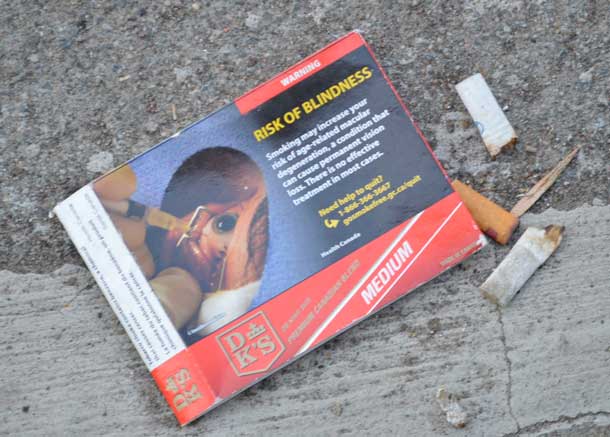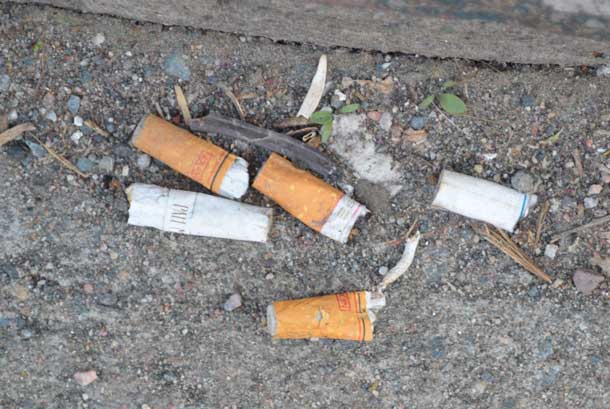
THUNDER BAY – Editorial – Smokers have rights. However those rights end the second that they impact the rights of others. In Thunder Bay, our streets are littered with cigarette butts, discarded plastic wrapping from cigarette packaging, and discarded packages from cigarette packages. It is a sign perhaps that in opposition to the evidence that smoking is dangerous to ones health, that smokers do not care as much for our city as they could. Too many smokers treat Thunder Bay as a giant ashtray.
Smokers rights end the second it impacts another person
Thunder Bay Regional Health Sciences Centre has taken steps to ban smoking. That has led to some complaints from smokers, who seem to feel that isn’t fair.
Give it a break!

As a health care facility, not only do the staff deal with all the ramifications from cigarette smoking, but the cost of dealing with the treatment of people struggling with those ramifications hits our health care costs in a massive way. Tobacco kills about 37,000 Canadians a year. Physicians for a Smoke-Free Canada estimate that every year, second-hand smoke kills from 1100 – 7800 Canadians.
Health insurance should be increased for smokers? If it were life insurance in the private sector, and one were engaged in a dangerous activity, the premium would go up drastically.
Ontario should triple the health care premium for a smoker. That tripling could be done by creating a health tax on cigarettes. For a pack a day smoker, adding $5 a pack to the price might even serve as an incentive to quit.
Hire a smoker?
Companies face the potential of reduced efficiency from employees who smoke. A worker headed out once an hour, for five minutes a day works forty minutes less a day than a non-smoker. Toss in the fact that smokers often take more sick days than non-smokers and the productivity falls even more.
For employers, choosing between two equal job candidates, the smoker in effect will be taking 33 hours a year, almost a week of work off on the company’s expense during the first year.
Even your hotel stay is impacted
The latest reports on the impact of smoking on non-smokers comes from a study in Britain on how smokers in a hotel impact all the rooms in the facility.
The study reported ten hotels in the sample operated complete bans and 30 operated partial smoking bans, providing designated non-smoking rooms.
Non-smokers who spent the night at any of the hotels, provided urine and finger wipe samples to assess their exposure to nicotine and a cancer causing agent found specifically in tobacco smoke – known as NKK – as measured by their metabolites cotinine and NNAL. The findings showed that smoking in hotels left a legacy of tobacco pollution in both smoking and non-smoking rooms. A partial smoking ban did not protect the occupants of non-smoking rooms from exposure to tobacco pollution.
Compared with hotels operating total smoking bans, surface nicotine and air 3EP levels were higher in both non-smoking and smoking rooms of hotels operating partial bans. Surface nicotine levels were more than twice as high in non-smoking rooms of hotels operating partial bans as those of hotels operating total smoking bans (3.7 µg/m2 compared with 1.4 µg/m2), while air levels of 3EP were more than 7 times as high.
Surface and air nicotine levels in rooms where previous guests had smoked were 35 and 22 times higher than those of rooms in hotels operating a total smoking ban.
Air nicotine levels in smoking rooms were significantly higher than in non-smoking rooms; and they were also higher 40% higher in non-smoking rooms of hotels operating partial smoking bans than in those operating total bans.
Similarly, hallway surfaces outside smoking rooms also showed higher nicotine levels than those outside non-smoking rooms.
Non-smokers who stayed in hotels with partial smoking bans also had higher levels of finger nicotine and urinary cotinine than those staying in hotels operating total bans. Urinary NNAL was also significantly higher in those staying in the 10 rooms containing the highest levels of tobacco pollutants.
Smoking Strategy Solutions
First step is to encourage smokers to quit. The evidence is there; health risk, the cost, and the reduced employment prospects.
Second is for schools, parents, and friends to encourage positive efforts to quit smoking.
As a non-smoker, all of us are paying the price for the activities of smokers.
For smokers, if all you can do is stop treating Thunder Bay like your personal ashtray, that would be a start.
Maybe stopping for a moment and realizing that the way you are treating your body is worse than you are treating our city streets and sidewalks is worse.
There is little that is positive about cigarette smoking. Maybe today it is your day to make a choice to quit.
All your real friends will support you.
James Murray
PS: The Thunder Bay District Health Unit offers you help. Visit “Take Control of your Life” for more information






